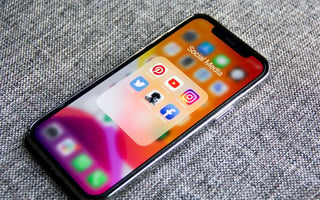One of the benefits of the lockdown and working from home is I get to see and hear more media...
The NHS, United Airlines, Carhartt, Next, Ocado, Morrisons – these are just some of the big-name brands that have found themselves walking a reputational tightrope as companies are increasingly drawn into making decisions about the health and safety of their workforce.
Whether it is new sickness policies that differentiate between the vaccinated and unvaccinated or vaccine mandates, organisations on both sides of the Atlantic are finding internal decisions can become major external reputational headaches.
And those issues are played out in front of a polarised audience ready to herald those who make decisions aligned to their views and chastise those with whom they don’t agree.
What does this emerging minefield mean for brands? And what crisis communication steps should they take now to prepare?
Let’s start by looking at some of these recent examples.
The supermarket chain Morrisons was one of several UK companies to make headlines after confirming it was cutting sick pay for unvaccinated workers forced to isolate after being exposed to Covid.
It means Unjabbed Morrisons workers who are told to isolate but test negative now get statutory sick pay of £96.35 a week, while Covid-positive staff get full sick pay regardless of vaccination status.
The company pays staff at least £10 per hour.
The move aims to encourage unvaccinated workers to get the jab and boost vaccination rates.
The clothing and homeware brand Next is another big corporate name that has taken the same approach towards unvaccinated staff.
A spokesperson said: "It's highly emotive but we have to balance the needs of the business with those of workers and shareholders."
Of course, not every company sees it this way. John Lewis has told its staff they will get full sick pay regardless of covid vaccination status.
It added it “doesn’t believe it’s right” to treat jabbed and unjabbed workers differently.
In the US, there has been a lot of recent focus on a clothing brand called Carhartt.
You will be familiar with this one if you heard this week’s episode of The Media Landscape podcast.
But to recap, the firm is facing calls for a boycott after a leaked memo showed it was standing by its decision to mandate covid vaccinations, despite a Supreme Court ruling against a federal mandate for private companies in the US.
Mark Valade, the company’s chief executive, said: "We put workplace safety at the very top of our priority list and the Supreme Court's recent ruling doesn't impact that core value.
"While we appreciate that there may be differing views, workplace safety is an area where we and the union that represents our associates cannot compromise. An unvaccinated workforce is both a people and business risk that our company is unwilling to take.”
That’s a stance that has divided opinion. Some have taken to social media to show their support for the company’s approach.
Shoutout to @Carhartt for prioritizing worker health in this way. https://t.co/Wpytqo4oEG
— Rebecca Mitchell, HD106 (@Rebecca4Georgia) January 18, 2022
I'm glad to support @Carhartt as they strive to get their workers vaccinated and stop the spread of Covid.
— Jason Rogers (@Rogers4Texas) January 24, 2022
Thank you! pic.twitter.com/gHqjKxybW9
Others, however, have responded angrily, and there have been calls to boycott the company.
I spend thousands a year on @Carhartt hoodies, jackets & winter gear. Today that ends. I guess I am looking for alternatives. Seriously, this is insane given their target market. I am done purchasing any of their stuff and giving them thousands in free advertising. pic.twitter.com/kyHaNwlO6c
— TheQuartering (@TheQuartering) January 18, 2022
Wow @Carhartt is subjecting their employees to medical abuse. Very bad look. Definitely should stop buying their products if you do pic.twitter.com/OyBdzQjwIK
— ELIJAH SCHAFFER 🇺🇸🇦🇺 (@ElijahSchaffer) January 18, 2022
Here’s what Julia Belle had to say about the story in the latest episode of the podcast.
“This is an outerwear brand that has found itself right in the throngs of a public health and political debate,” she said.
“And I think that is an indicator that as governments back off, it is pushing more of the spotlight on to employers themselves.
“They have, like it or not, more and more agency over their political stance on covid restrictions – Are you asking for masks to be worn around the office? Are you implementing regular testing? Are you requiring vaccines? Are you demanding that people come into work even if they are hesitant?
“Whatever route a company takes, there isn’t a government mandate to hide behind. And I think that means whatever choice is made, careful strategy on messaging and crisis planning is essential.”
And there are some crucial lessons in what Julia said.
The messaging needs to be developed and tested as these decisions are made. Those messages need to explain why you have taken that decision and why you believe it is the right approach for your business and employees.
But it is also important to acknowledge you understand it is a controversial issue and that not everyone will agree with your stance.
If you look back at what Carhartt said, the company did this well.
Part of that messaging work should involve understanding that what you say internally will probably end up being leaked externally and go public when the subject is controversial.
So, don’t say anything internally you would be embarrassed to see in the public arena or that you are likely to backtrack from when pressure rises.
The latest developments in the Carhartt story came from a leaked internal memo, while the John Lewis approach emerged in a LinkedIn post from its group operations director. Other brands need to be aware of the likelihood of stories emerging in this way.
Additionally, these types of societal and political decisions need to be factored into crisis communication planning.
While things like natural disasters, workplace accidents and, more recently, data breaches tend to be put forward as likely crisis scenarios and high-risk factors, more and more companies are finding the factors driving them into the spotlight are changing.
Policies and values are placing brands in the headlines, exposing them to intense scrutiny, and making them trend with increasing regularity.
Knowing what to do and how to respond to these issues will enable organisations to communicate quickly and confidently about them when they are in the spotlight.
Of course, you may not be planning to bring in any policies around vaccinations. But there are other similar divisive issues on this horizon. For example, as restrictions ease and there is pressure to ‘return to normal’, what will your organisation’s approach be to those that are hesitant or who simply no longer want to work from an office?
Finally, it is crucial to be realistic and remember that no matter how well you prepare and how good those messages are, you will not please everyone.
Brands are communicating in an increasingly challenging arena to a divided audience with entrenched views.
Whatever you say, some will take offence. I’ve seen people calling for boycotts of Next, Morrisons and Ocado because of their positions. And we’ve shown you the backlash faced by Carhartt – ‘cancel culture’ is alive and well.
But for all the anger, noise and outrage, there’s a big difference between vowing not to do something while say behind a keyboard and sticking to that decision when it impacts your life.
If you need a pint of milk, are you going to go out of your way to avoid Morrisons because you don’t like its vaccination policy? If you need new jeans, are you going to avoid Next?
I have my doubts. In fact, many of the people threatening to boycott a particular company have probably never been a customer.
And if these boycott calls were in any way successful, we would soon be facing a time where there is nowhere left to shop, such is their regularity.
So, what are we saying here? If controversial internal issues find themselves in the public arena, they will inflame. And that could result in negative sentiment and reputational brand damage.
It may not be a business ending crisis. But it is something needing to be managed carefully and with compassion.
Our advice is to ensure comms and media experts have a seat at the executive table. They should advise on internal policies and offer foresight on how they may play out in public.
As well as acting as a conscience for the brand, they are also then ideally placed to prepare quickly. Spokespeople need to be briefed, messages developed and media and social media crisis plans considered and updated.
As let’s face it – if the perception is that you don’t look after your staff, people will wonder how you treat your customers?
Media First are media and communications training specialists with over 35 years of experience. We have a team of trainers, each with decades of experience working as journalists, presenters, communications coaches and media trainers.
Click here to find out more about our media training, crisis communication courses and message development and testing.
Subscribe here to be among the first to receive our blog.




